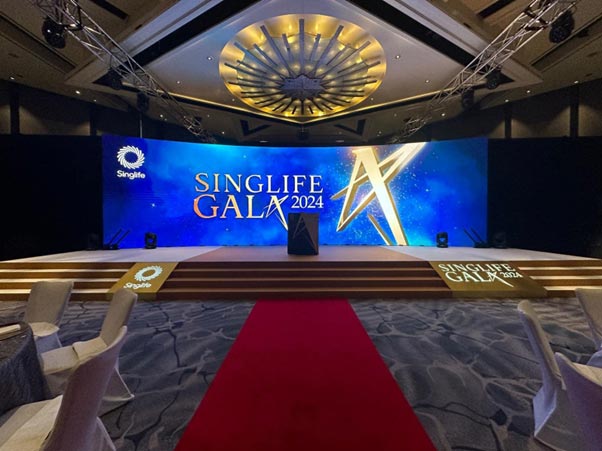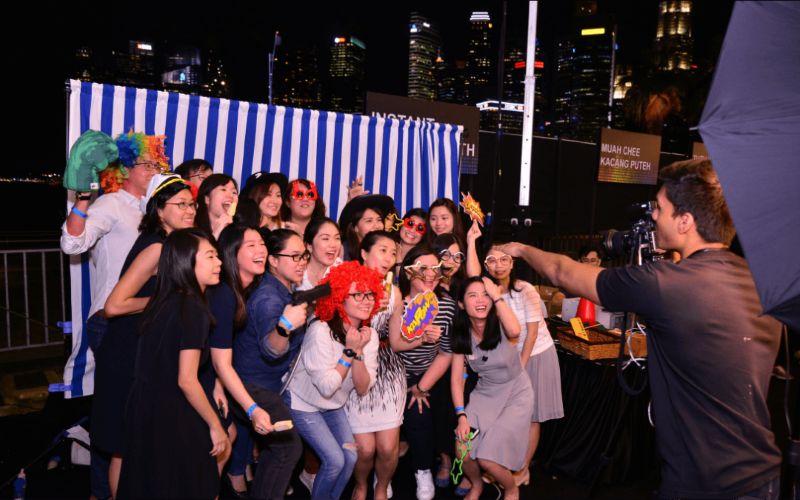The event planning industry is in a constant state of evolution, continually adapting to new trends and technologies. As we look forward to 2024-2025, several key trends are ready to significantly influence the global landscape of events and exhibitions. These trends promise to enhance the event planner role, offering new opportunities for engagement and innovation.

Event planners will need to stay ahead of these changes to create memorable and impactful experiences. Moreover, these trends underscore the importance of sustainability and personalization, which are becoming increasingly critical to meeting the expectations of modern audiences. By embracing these emerging trends, event company in Singapore can ensure they deliver exceptional events that resonate with attendees and stand out in a competitive market.
1. Immersive Technology

One of the most significant trends is the integration of immersive technology in events. Virtual Reality (VR), Augmented Reality (AR), and interactive installations are transforming the way attendees experience events. These technologies enable event organisers to create highly engaging and memorable experiences. For instance, VR can transport attendees to virtually any location, providing immersive tours or interactive product demos. AR can enhance physical spaces with digital overlays, offering interactive guides or real-time data visualisations. Such innovations not only captivate audiences but also provide unique networking opportunities and new avenues for branding and sponsorship.
Key Aspects of Immersive Technology:
- Virtual Reality (VR): Provides immersive environments and interactive experiences.
- Augmented Reality (AR): Enhances physical spaces with digital overlays.
- Interactive Installations: Engages attendees through hands-on experiences.
2. ESG-Focused Designs
Environmental, Social, and Governance (ESG) policies are becoming increasingly crucial in event planning. There is a growing emphasis on sustainability, with event organisers striving to reduce their carbon footprint and promote eco-friendly practices. This includes using renewable energy sources, minimising waste, and encouraging sustainable transportation options. By aligning with global sustainability efforts, Singapore event planners can resonate with environmentally conscious attendees and demonstrate their commitment to responsible practices. Additionally, diversity and inclusion will play a significant role in event design, ensuring that events are accessible and welcoming to all.
Sustainability Practices in Events:
- Renewable Energy: Using solar, wind, or other renewable energy sources.
- Waste Minimization: Reducing waste through recycling and composting.
- Sustainable Transportation: Promoting carpooling, public transport, and eco-friendly vehicles.
3. 1-to-1 Interactions

While the pandemic saw a surge in virtual events, there is a noticeable shift back towards in-person events, complemented by digital touchpoints. These hybrid events leverage technology to gather valuable insights into attendee behaviours and preferences. Advancements in transportation and communication technologies are making it easier for people to attend international conferences, trade shows, and exhibitions. These global gatherings provide unparalleled networking opportunities and facilitate the exchange of knowledge among professionals from diverse backgrounds, enriching the event experience.
Benefits of 1-to-1 Interactions:
- Personalised Engagement: Tailoring interactions to individual preferences.
- Networking Opportunities: Facilitating connections among professionals.
- Global Reach: Enabling international participation and collaboration.
4. Personalising Event Experiences
Personalization is set to be a major trend in the event industry. Organisers, brands, and design agencies are focusing on creating tailored experiences that cater to the unique preferences of each attendee. This approach helps build stronger connections with the target audience and distinguishes events from the competition. By utilising data analytics and attendee feedback, Singapore event planners can design highly customised experiences, from personalised invitations and targeted content to bespoke on-site activities and follow-up communications.
Elements of Personalized Event Experiences:
- Data Analytics: Using data to understand attendee preferences.
- Tailored Content: Customising content to meet individual interests.
- Bespoke Activities: Creating unique on-site experiences for attendees.
5. Professional Expertise
The complexity of event planning company underscores the need for professional expertise. From venue selection and registration to space design, marketing, and attendee engagement, successful event planning involves numerous moving parts. The demand for professional project managers and fit-out agencies is on the rise. These experts bring a wealth of knowledge and experience, ensuring that every aspect of an event is meticulously planned and executed. In 2024-2025, we can expect a significant increase in the hiring of agencies that specialise in ideation, creation, implementation, and management, creating seamless and impactful experiences for the target market.
Roles of Professional Experts:
- Project Managers: Overseeing all aspects of event planning and execution.
- Fit-Out Agencies: Specialising in event design and installation.
- Marketing Professionals: Ensuring effective promotion and attendee engagement.
Conclusion:
As we move into 2024-2025, the event planning industry will be shaped by the integration of immersive technology, a strong focus on sustainability, a return to in-person events enhanced by digital elements, personalised attendee experiences, and the expertise of professional planners. These trends not only promise to enrich the event experience but also present exciting opportunities for innovation and growth. Event organisers and attendees alike can look forward to a dynamic and forward-thinking industry that continues to push the boundaries of what is possible.
Table: Emerging Trends in Event Planning
|
Trend |
Key Features |
Benefits |
|
Immersive Technology |
VR, AR, Interactive Installations |
Engaging experiences, unique networking opportunities, new branding avenues |
|
ESG-Focused Designs |
Renewable energy, waste minimization, sustainable transportation |
Reduced carbon footprint, alignment with sustainability efforts, appeal to eco-conscious attendees |
|
1-to-1 Interactions |
Personalised engagement, networking opportunities, global reach |
Tailored experiences, professional connections, diverse participation |
|
Personalising Event Experiences |
Data analytics, tailored content, bespoke activities |
Stronger audience connections, differentiation from competitors, enhanced attendee satisfaction |
|
Professional Expertise |
Project managers, fit-out agencies, marketing professionals |
Seamless planning and execution, expert design and management, effective promotion |
Key Takeaways:
- Immersive Technology: Revolutionizes event experiences with VR, AR, and interactive elements.
- ESG-Focused Designs: Emphasises sustainability and inclusion in event planning.
- 1-to-1 Interactions: Combines in-person and digital elements for personalised engagement.
- Personalising Event Experiences: Utilises data to create unique, tailored experiences.
- Professional Expertise: Highlights the importance of skilled professionals in successful event execution.

By embracing these trends, event planner can create more impactful, engaging, and responsible events that meet the evolving needs and expectations of their audiences. As the industry moves forward, these innovations will help shape a vibrant and sustainable future for events worldwide. For more information about the event planning please contact Tembusu events, phone no. +65 8339 3022. To make your event more memorable by adding unique entertainment and personalised touches.


Recent Comments